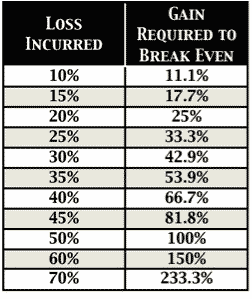 1) The Gambler Trades Through Earnings Reports: If you are a trader (as opposed to an investor) and decide to hold a stock/option position through earnings you are gambling. Due to the very nature of earnings reports your position could gap down or up; therefore, you are choosing to take a big chance (e.g., gamble) on what that stock will do post earnings. Sure, you could get lucky and win big, but you could also lose big. Long term success in the stock market is not about luck, but about skill. There will always be another trade on another day. Think before you trade making sure the odds (i.e. the probabilities) are with you, not against you.
1) The Gambler Trades Through Earnings Reports: If you are a trader (as opposed to an investor) and decide to hold a stock/option position through earnings you are gambling. Due to the very nature of earnings reports your position could gap down or up; therefore, you are choosing to take a big chance (e.g., gamble) on what that stock will do post earnings. Sure, you could get lucky and win big, but you could also lose big. Long term success in the stock market is not about luck, but about skill. There will always be another trade on another day. Think before you trade making sure the odds (i.e. the probabilities) are with you, not against you.
2) The Gambler Trades Without A Plan: If you make your trading decisions based on the morning news, on the latest BLUE CHANNELS story, on a new strategy not yet tested, or on a market that you have never traded, then you are gambling. The successful trader has an army of stocks to trade, the weapons suited for that army, and a time tested trading strategy in place before a position is considered. When everything is going according to plan then and only then will it be time to pull the trigger.
3) The Gambler Goes ALL IN and Risks Losing It All: If you trade ALL IN, believing your trading edge is 100% foolproof, then you are a gambler. There is no sure thing in the stock market. There are just too many variables and too many traders who can and will disagree with your perfect signal. The disciplined trader trades a small percentage of his account balance and believes in probabilities, not a sure thing, knowing that trading is not about being right but about making money.
It is best to leave gambling to the casinos where the house has the advantage. In trading, the trader who has the focus, patience, and discipline to follow a strategy will have the advantage over those who don’t every time. We trade the trader, not the market and when we make money it is usually when we trade against the gambling trader.





 Nicholas Atkeson and Andrew Houghton, founding partners of Delta Investment Management, have written what, in the words of the lengthy subtitle, is a disciplined approach to building and protecting your wealth in the stock market by managing your risk. Win By Not Losing (McGraw-Hill, 2013) is a mix of stories about some not-so-famous investors (in fact, a few are identified simply by their first names) and an introduction to tactical investing.
Nicholas Atkeson and Andrew Houghton, founding partners of Delta Investment Management, have written what, in the words of the lengthy subtitle, is a disciplined approach to building and protecting your wealth in the stock market by managing your risk. Win By Not Losing (McGraw-Hill, 2013) is a mix of stories about some not-so-famous investors (in fact, a few are identified simply by their first names) and an introduction to tactical investing.